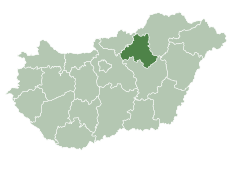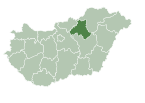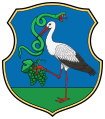
Austria-Hungary, often referred to as the Austro-Hungarian Empire or the Dual Monarchy, was a multi-national constitutional monarchy in Central Europe between 1867 and 1918. Austria-Hungary was a military and diplomatic alliance of two sovereign states with a single monarch who was titled both Emperor of Austria and King of Hungary. Austria-Hungary constituted the last phase in the constitutional evolution of the Habsburg monarchy: it was formed with the Austro-Hungarian Compromise of 1867 in the aftermath of the Austro-Prussian War and was dissolved shortly after Hungary terminated the union with Austria on 31 October 1918.

Hungary is a landlocked country in Central Europe. Spanning 93,030 square kilometres (35,920 sq mi) of the Carpathian Basin, it is bordered by Slovakia to the north, Ukraine to the northeast, Romania to the east and southeast, Serbia to the south, Croatia and Slovenia to the southwest, and Austria to the west. Hungary has a population of 9.7 million, mostly ethnic Hungarians and a significant Romani minority. Hungarian, the official language, is the world's most widely spoken Uralic language and among the few non-Indo-European languages widely spoken in Europe. Budapest is the country's capital and largest city; other major urban areas include Debrecen, Szeged, Miskolc, Pécs, and Győr.

Hungarian is a Uralic language spoken in Hungary and parts of several neighbouring countries that used to belong to it. It is the official language of Hungary and one of the 24 official languages of the European Union. Outside Hungary, it is also spoken by Hungarian communities in southern Slovakia, western Ukraine (Subcarpathia), central and western Romania (Transylvania), northern Serbia (Vojvodina), northern Croatia, northeastern Slovenia (Prekmurje), and eastern Austria.

Transylvania is a historical and cultural region in Central Europe, encompassing central Romania. To the east and south its natural border is the Carpathian Mountains and to the west the Apuseni Mountains. Broader definitions of Transylvania also include the western and northwestern Romanian regions of Crișana and Maramureș, and occasionally Banat. Historical Transylvania also includes small parts of neighbouring Western Moldavia and even a small part of south-western neighbouring Bukovina to its north east. The capital of the region is Cluj-Napoca.
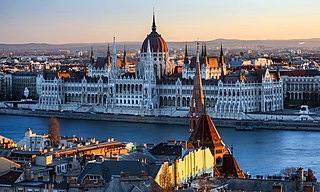
Budapest is the capital and most populous city of Hungary. It is the ninth-largest city in the European Union by population within city limits and the largest city on the Danube river; the city has an estimated population of 1,752,286 over a land area of about 525 square kilometres. Budapest, which is both a city and county, forms the centre of the Budapest metropolitan area, which has an area of 7,626 square kilometres and a population of 3,303,786. It is a primate city, constituting 33% of the population of Hungary.

Franz Joseph I or Francis Joseph I was Emperor of Austria, King of Hungary, and the ruler of the other states of the Habsburg monarchy from 2 December 1848 until his death in 1916. In the early part of his reign, his realms and territories were referred to as the Austrian Empire, but were reconstituted as the dual monarchy of the Austro-Hungarian Empire in 1867. From 1 May 1850 to 24 August 1866, he was also president of the German Confederation.
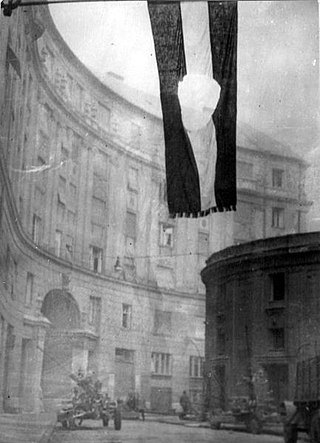
The Hungarian Revolution of 1956, also known as the Hungarian Uprising, was an attempted countrywide revolution against the government of the Hungarian People's Republic (1949–1989) and the policies caused by the government's subordination to the Soviet Union (USSR). The uprising lasted 12 days before being crushed by Soviet tanks and troops on November 4, 1956. Thousands were killed and wounded and nearly a quarter of a million Hungarians fled the country.

The Hungary national football team represents Hungary in men's international football, and is controlled by the Hungarian Football Federation. The team has made nine appearances in the FIFA World Cup, and five appearances in the UEFA European Championship. Hungary plays their home matches at the Puskás Aréna, which opened in November 2019.
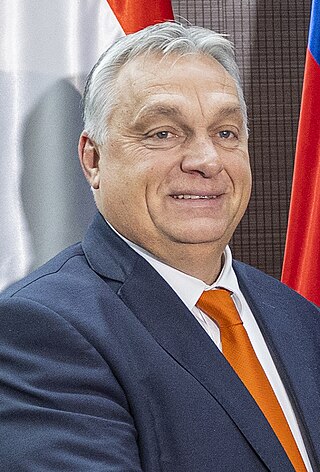
Viktor Mihály Orbán is a Hungarian politician who has been Prime Minister of Hungary since 2010, previously holding the office from 1998 to 2002. He has presided over Fidesz since 1993, with a break between 2000 and 2003.

The Kingdom of Hungary was a monarchy in Central Europe that existed for nearly a millennium, from the Middle Ages into the 20th century. The Principality of Hungary emerged as a Christian kingdom upon the coronation of the first king Stephen I at Esztergom around the year 1000; his family led the monarchy for 300 years. By the 12th century, the kingdom became a European middle power within the Western world.

The Habsburg monarchy, also known as Habsburg Empire, was the collection of empires, kingdoms, duchies, counties and other polities that were ruled by the House of Habsburg and, following the partition of the dynasty, especially by its Austrian branch. From the 18th century it is also referred to as the Danubian monarchy or the Austrian monarchy.
The Delegation for the Adoption of an International Auxiliary Language was a body of academics convened in the early part of the 1900s (decade) to decide on the issue of which international auxiliary language should be chosen for international use. The ultimate decision of the committee charged by the Delegation was to adopt the Esperanto language, but with certain reforms. The result became a distinct language known as Ido.

Heves county lies in northern Hungary, between the right bank of the river Tisza and the Mátra and Bükk mountains. It shares borders with the Hungarian counties Pest, Nógrád, Borsod-Abaúj-Zemplén and Jász-Nagykun-Szolnok. Eger is the county seat.

Eger wine region is a Hungarian wine region in North-Eastern Hungary. It is famous for its red blend, Egri Bikavér and for some whites like Egri Leányka, Debrői Hárslevelű or Egerszóláti Olaszrizling. Its center is the town of Eger.

Hungarians, also known as Magyars, are a nation and ethnic group native to Hungary and historical Hungarian lands who share a common culture, history, ancestry, and language. The Hungarian language belongs to the Uralic language family, alongside, most notably Finnish and Estonian.
Maklár is a municipality in Heves county, in the Egri Subregion in Hungary. It lies between the villages of Kerecsend, Nagytálya, Novaj (Hungary), Szihalom and the town of Füzesabony. The village is located on the west banks of the Eger Creek, which name changes from here to Rima Creek. Maklár is located 11 kilometers south from Eger and 6 kilometers north from Füzesabony. The village has a railway station on the Eger-Füzesabony railway line.
Novaj is a village in the former municipality of Bogovë in Berat County, Albania. At the 2015 local government reform, it became part of the municipality Skrapar.

Eger is a district in eastern part of Heves County. Eger is also the name of the town where the district seat is found. The district is located in the Northern Hungary Statistical Region. This district lies between of Bükk Mountains and Mátra Mountains geographical region.

The Abbas ibn Ali Türbe is a Bektashi türbe is a Bektashi shrine traditionally considered to be the resting place of Abbas ibn Ali (647–680), a son of Ali. It is situated on the southern peak of Mount Tomorr in Berat, south-central Albania. A large annual pilgrimage is currently held every year from 20-25 August.
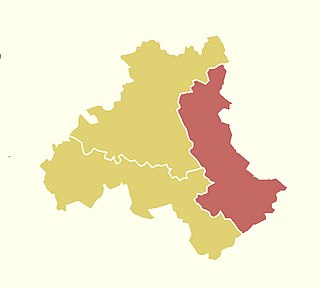
The 1st constituency of Heves County is one of the single member constituencies of the National Assembly, the national legislature of Hungary. The constituency standard abbreviation: Heves 01. OEVK.

